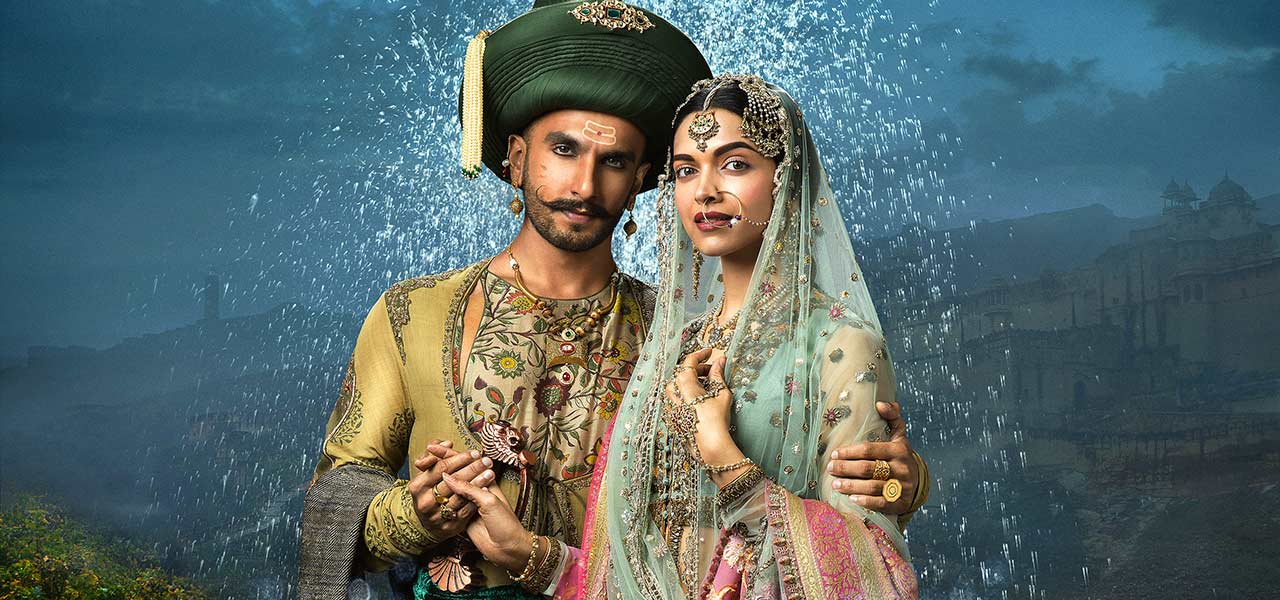By Chlotrudis Independent Film Society
Rating: 2.75
Director: Sanjay Leela Bhansali
Starring: Benjamin Gilani | Deepika Padukone | Irrfan Khan | Priyanka Chopra | Ranveer Singh | Tanvi Azmi

Year: 2015
Jason says: “I guess it’s an improvement that somewhere during the second half of BAJIRAO MASTANI I backed off thinking of it as being a historical romance where nearly everybody is a terrible person, instead considering it one where people are simply selfish, occasionally stumbling into righteousness by accident. It’s at least impressively mounted, so even if the love story leaves a bit of a bitter taste in one’s mouth, there’s certainly enough spectacle to make up for some of that.
“As the film starts, Bajirao Ballal (Ranveer Singh) is appointed the new Peshwa (prime minister) of the Marathi Empire based upon his prowess in battle, wit, and political acumen, though it is not an entirely popular choice. In the middle of a mission of conquest, a warrior demands to speak with him; it turns out to be Mastani (Deepika Padukone), the daughter of Raja Chhatrasaal (Benjamin Gilani), whose city is under attack. He diverts to fight that battle, and love soon grows between Bajirao and Mastani. He gives her his dagger, unaware that in her culture a girl is married by accepting such a gift. She, then, follows him to his new palace, Shanivaar Wada, where she is not exactly welcomed with open arms by Bajirao’s mother Radhabai (Tanvi Azmi) – or his first wife Kashibai (Priyanka Chopra), and that’s before they learn that Mastani’s mother is Muslim.
“I’m going to guess that if I were steeped more in Indian culture and traditions, the conflicts in this film would have a little more resonance for me, but with that not the case, it sure seems like the romance that the film wants us to root for is yet another preening jackass who wants to have a second lover without considering the effect it has on his existing family and a woman who is fairly ruthless about staking her own claim. The irony, then, is that even if one is inclined to disapprove of their rapidly- established but at least genuine love, the people opposing it are far more horrible. The only truly sympathetic character is Kashi, and her role in this story is frustratingly familiar – to be hurt, told that she is still important to Bajirao despite evidence to the contrary, and to try to make it work because, really, what other options does a woman in her position have?
“Of course, if director Sanjay Leela Bhansani had rewritten Bajirao as being ahead of his time culturally or made Kashi more unpleasant to make her husband’s eye wandering more palatable, that would have been troublesome in its own way. The script by Prakash Kapadia (and what Bhansani does with it) have other issues with tone, such as when a scene of Bajirao pulling an obvious bluff is celebrated as a great victory, complete with adulatory musical number, despite it coming across as him getting lucky that his cockiness was matched by his rival’s foolishness rather than a great triumph. There are scenes that introduce subplots that will never be referenced again, and a never-before-mentioned soon in his teens or early twenties that makes one wonder just how old Bajirao and Kashi are supposed to be, if they weren’t married at the age of 14 or so (entirely possible, but ick). On the other hand, using the intermission – or where it would be if the theater didn’t just play the movie straight through – as a good way to fast-forward past a couple of pregnancies is just as good a way to make that break functional as Indian films’ usual redirection.
“Plus, look at this thing. Gorgeous productions seem to be one of Bhansani’s trademarks – he directed the beautiful Ram-Leela a few years back – and Bajirao Mastani is often worth gawking at. Even if there are some cases where you can see the digital assistance, there’s just enough stylization in the opening credits to suggest the action scenes don’t need to be entirely realistic. There aren’t many of those, but they are memorable, whether elephants are involved or not. The song-and-dance numbers are energetic and dazzling to look at, although the songs seem kind of basic (the subtitles often read like ‘this is the love song’, ‘this is the victory song’, etc.). The environments are dazzling, especially Shanivaar Wada with its Hall of Mirrors that function as an unusual camera obscura, as are the costumes, even if as a practical matter the large nose-rings sometimes obscure Kashi’s and Mastani’s expressions.
“Despite that, the cast is pretty good, too. Certainly, some of that assessment depends upon assuming that Ranveer Singh is going for arrogance, especially since he stumbles a bit when the final scenes require Bajirao’s confidence shaken. Deepika Padukone is strong as well, making Mastani’s lovelorn state an extension of her warrior spirit. A couple women do well in the supporting cast; Priyanka Chopra, for instance, takes what could be the film’s most thankless role and makes finds the spot where she can be angry and offended but also a good enough person to deal with Kashi rather than scorn her. There’s no such subtlety to Tanvi Azmi’s Radhabai, but she’s deliciously malicious, an enemy to Mastani but one whose motivations are clear and human.
“Still, there’s great pleasure in seeing Bajirao and Mastani rebel against tradition, even if they don’t exactly get there out of idealism. Not enough to make BAJIRAO MASTANI a great film (or a particularly good introduction to Bollywood for those who discovered Chopra on Quantico and want to see the other side of her career), but it winds up a decent romantic historical epic almost in spite of its central couple. 2.75 cats
“Seen 29 December 2015 in Apple Cinemas Cambridge #3 (first-run, DCP)”
